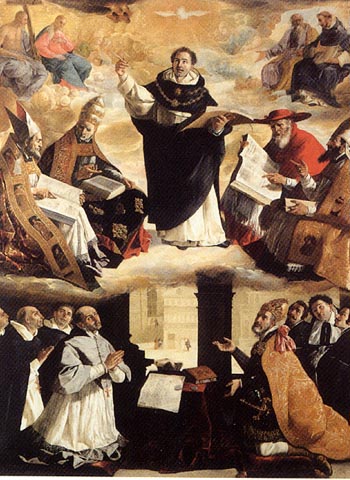

There have been several long threads on matters surrounding what it means to see God in previous posts. For those new to the debate, please feel free to browse through the following five posts and their comments:
Benedict XII on Seeing the Divine Essence of God in the Beatific Vision
Adrian Fortescue on Gregory Palamas and Hesychasm
The beatific vision and the light of glory
How should we properly understand Adam and Eve before the Fall?
Is happiness in this life or in the vision of the God’s essence?
We are essentially discussing what is the goal or purpose of human life for which God created us? This question requires three other questions:
First, will the blessed see God? The answer is that we do see God, as Scripture says “Blessed are the pure in heart, for they shall see God.”
Secondly, does “seeing God” imply comprehending God or fully understanding Him? The answer to this question is unanimous in the Scriptures and in the Church Fathers – No, we cannot fully comprehend or understand God’s essence because He is infinite and we are created and limited.
O most mighty, great, and powerful, the Lord of hosts is Thy Name. Great in counsel, and incomprehensible in thought” (Jeremiah 32:18-19).
Here we come to a difficulty. What does it mean to “see” but not “understand”? It has been noted here that there is a tendency in the East to interpret “seeing” as “understanding”. Consequently, Eastern theologians say that we neither understand nor see the Divine Essence. My suspicion is that this is because the Greek word “eido” can mean both “I see” and also “I know” or “I understand”.
We make the same connection between seeing and knowing in English. When I say, “Do you see what I’m saying?” I mean, “Do you understand what I’m saying?” When someone says, “Aha, now I see it,” what he means is that he finally understands something.
Third, we must now ask, “How can we use the biblical language of ‘seeing God’ if God is ‘incomprehensible'”? By the fourteenth century, the East and the West had codified two rather ingenious ways of handling this problem.
In the West, vision and comprehension were strictly distinguished. Grace perfects the nature of the blessed human. The blessed human becomes deiform (deiformis, Summa theologiae I, q. 12, a. 5) and capable of seeing God’s essence (essentia), though he does not fully comprehend God’s essence (essentia
). The human’s vision of God is greater or lesser depending on his level of charity. For example, the Blessed Virgin Mary has a greater vision of God’s essence than that of the deathbed convert.In the East, it had been firmly established that God’s essence (oὐσία
) is incomprehensible, unknowable, and invisible. This would seem to contradict the biblical promise that the blessed “shall see God”. Yet this does not trouble the Eastern theologians since God’s essence (oὐσία) can be distinguished from his activities or energies (ἐνέργεια). Since God’s ἐνέργεια are truly God Himself, the blessed can see God’s ἐνέργεια. Problem solved: The faithful see God’s ἐνέργεια but not His oὐσία.What have we learned so far?
On one hand, the Catholic tradition is naturally perplexed by the Orthodox distinction between oὐσία and ἐνέργεια for two reasons:
1. It seems to undermine divine simplicity – that is, it seems to imply that God is undivided. If God is both His essence and His energies and then how is He undivided?
2. In Latin, essence is understood as “what it is to be” something. If the energies of God are not the essence of God, then it appears that the energies are not “what it is to be God”. Consequently, the energies are not really divine.
On the other hand, the Orthodox tradition is naturally perplexed by the Catholic position for three reasons:
1. The distinction between “seeing” and “understanding” seems artificial, so that the human apprehension of God’s essence in Catholicism seems to be overly intellectual.
2. The Catholic insistence on divine simplicity seems to lead to an abstraction of the three Divine Persons of the Trinity, i.e. it leads to modalism.
3. The absence (or denial) of divine energies in Catholic theology entails a reliance on “created grace” and “created light” which the Eastern theologian finds superfluous.
I don’t mean to make judgments in this post or any conclusions. Perhaps those who have been following this discussion so far would comment as to whether I have rightly or wrongly laid out the issues and problems for this debate.
Thanks and God’s blessings. Christ is risen! Alleluia!


Comments Policy: I reserve the right to delete comments that are offensive or off-topic. If your comment contains a hyperlink to another site, your comment automatically goes into "Comments Purgatory" where it waits for release by way of moderation.